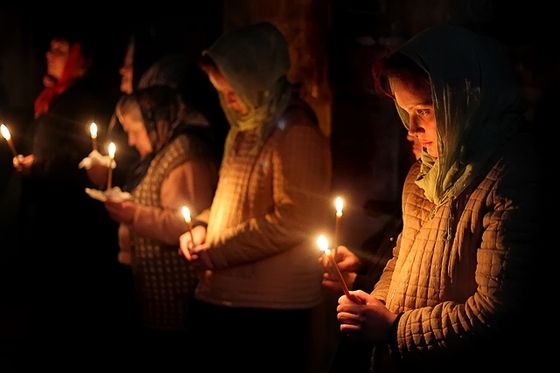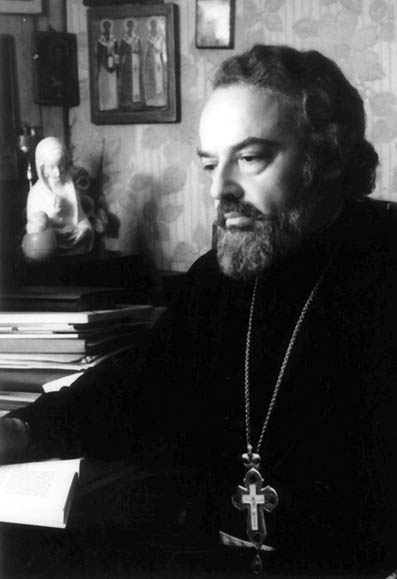In the Name of the Father, and of the Son, and of the Holy Spirit!
Once St. Gregory the Theologian, praying in the church in Constantinople on the feast of the Nativity of Christ, addressed the people with an enthusiastic speech that began with these words: “Christ is born! Come out to meet Him! Christ descends from Heaven in order to raise us up!”
St. Gregory was not only a great theologian of the Church, but also a great poet and composer of church hymns. His words: “Christ is born! Come out to meet Him” was so beloved by the inhabitants of Constantinople, that each time they repeated them, and even created from them a hymn that precedes the feast of the Nativity of Christ. From this Sunday we have already begin to chant these irmosoi: “Christ is born! Glorify Him! Christ is from heaven; go and meet Him.” The Nativity Fast has begun, and we are preparing ourselves for the Feast of the Nativity of Christ.
We should not think that the feast is just a pleasant time when we can rejoice, congratulate one another, and be comforted in our sorrows! No, the Feast of the Nativity of Christ is a reminder that the Lord came to earth to die and suffer along with us, so that each one of us would receive eternal life, so that each one of us might join in salvation. And this feast is a day of choice: some accept it, and others reject it.
For us, who have received the Word of Christ, preparing for the feast is a preparation for encountering the Lord Himself! Yes, He Himself as it were comes anew to earth in order to visit you in your life, to ask you how you lived, that you might bring out the treasure of your heart and your deeds. Christ is born, go out to meet Him, prepare yourself for Him!
The Lord Himself, in various parables, spoke of how people should prepare for this encounter. In Holy Scripture, in the Prophet Amos, there are these fearsome words: “Prepare to meet thy God” (Amos 4:12). This does not mean that we need to prepare ourselves only for God’s Last Judgment, but that the Lord comes here and now to each one of us. He comes and requires of us an account, just as the master required of those to whom he had given the talents. We should not think that the Lord’s parables contain anything superfluous: in them, each words counts.
Let us recall the parable of the ten virgins. They were to await the bridegroom; they should have stood on guard. But he lingered, and they fell asleep. So it is with us: it may be that the Lord will linger to reveal Himself, and we sleep spiritually while we should be on guard. Always be ready – always, at any moment, because He can require an accounting from us. This encounter will only be joyous if we have at least done something, if we have at lest somehow prepared. When you await a special guest, how sad it is, how embarrassing it is, if he comes suddenly, before you have had a chance to clean house, if you have not prepared the table. So it is with man. But when we await the Lord Himself, Who will visit us, bless us, and enlighten us with His Holy Spirit – how must we prepare our “house,” that is, our soul and our heart! How must we cleanse it! How can the bright guest – Christ, Who is born – enter into the dirty habitation of our soul that has not been cleansed?!
And now, my dear ones, I would like that the Nativity Fast be for you not just a time of abstinence, but a time of preparation, that you would believe and hope that, on the Feast of the Nativity of Christ, you might all feel His real coming, His closeness, and His grace-filled power!
Let us prepare and cleanse our hearts through prayer, repentance, and tirelessly delving into the Word of God, Holy Scripture. Let us battle with all that is unclean in our hearts and in our actions, laboring for one another, and preparing to attend to the Lord. And each Sunday we will hear sound forth the words that remind us of the proximity of the holy day: “Christ is Born! Glorify Him! Christ is from heaven; go and meet Him!” Prepare to meet Him: our Lord is coming!
Amen.
An Epistle for the Beginning of the Nativity Fast
METROPOLITAN LONGIN OF SARATOV AND VOLSK | 28 NOVEMBER 2012
Dear brothers and sisters!
We have entered the days of the Nativity Fast, that period of preparation for one of the greatest feasts of the Orthodox Church: the radiant and joyful day of the Nativity of Christ. In his daily life, modern man is immersed in his usual earthly deeds, cares, and concerns. It can be difficult for him to put aside all earthly things and turn to the heavenly, eternal, and Divine. The law of the Gospel is known and accessible to all, but man in his weakness often stumbles and commits sin. The more his soul is burdened, clinging to the earth, the more difficult it becomes for him to perceive the spiritual.
The Church, therefore, has wisely established a time of fasting for Christians: a time of penitential introspection, of work on oneself, and of conforming oneself to the traditions, foundations, and rules of the Church, including the ecclesiastical canons. In this regard, modern society’s attitude towards the fast is no exception: one hears questions about whether it is necessary, about whether one can forego, mitigate, or shorten it. But it is characteristic of the true Christian to be completely obedient to the Mother Church, accepting that which it has established and which has been observed by its faithful children for centuries.
People with an inadequate conception of church life often perceive the fasts as being concerned exclusively with limitation in food, in both quantity and quality. But fasting is primarily a spiritual matter. Today the spirit of sacrifice and the capacity for self-denial are dying out. Fasting is the best means of reviving this spirit, through restraining the flesh and resisting its insistent demands.
Yet it should go without saying that bodily fasting alone, such as abstaining from foods of animal origin, is incomplete and incorrect. Spiritual fasting is essential: the rejection of entertainments, amusements, and of everything that in ordinary, non-fasting, times might sting a Christian’s conscience. In order to understand the fast’s essence, its true content, one should spend as much time as possible in church throughout the duration of the fast and be more diligent in fulfilling one’s personal rule of prayer. During this time it is especially important to live to the fullest possible extent within the mysteriological, grace-filled life of the Church by approaching the Mysteries of Confession and Communion more frequently.
I know well how difficult fasting can be for Christians living amidst the world. They often meet with incomprehension from friends and colleagues – and not only incomprehension, but rejection and even ridicule. This sometimes causes the cowardly desire to abandon the fast, so as not to appear strange in people’s eyes or to stand out from their surroundings. But it should be firmly understood that the steadfast observance of church rules by Christians, although it might seem unusual to non-churchgoers, will command their involuntary respect. Our fasting itself can become a wordless sermon for many, reminding them of our faith and of that great and majestic event for which we are preparing by means of this fast.
I sincerely wish you to complete the course of this fast with spiritual profit, peering attentively into your souls and hearts during these days in order to cleanse them of everything that could hinder God – Who became Man for our sake and our salvation by descending from heaven to earth – from entering and making His abode in them. We will render to the Lord only the small labor of abstinence that is within our powers, and He will grant us His great and incomparable spiritual joy – the joy of the living knowledge that God has appeared unto us in order to be with us always, never leaving those who have put their trust in Him, through the joy of Christ’s radiant Nativity.
The humble LONGIN,
By the mercy of God, Bishop of Saratov and Volsk,
2003



No comments:
Post a Comment